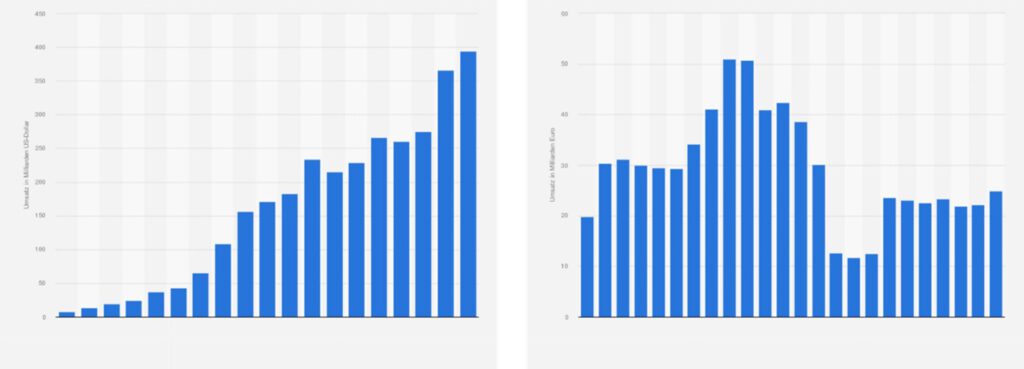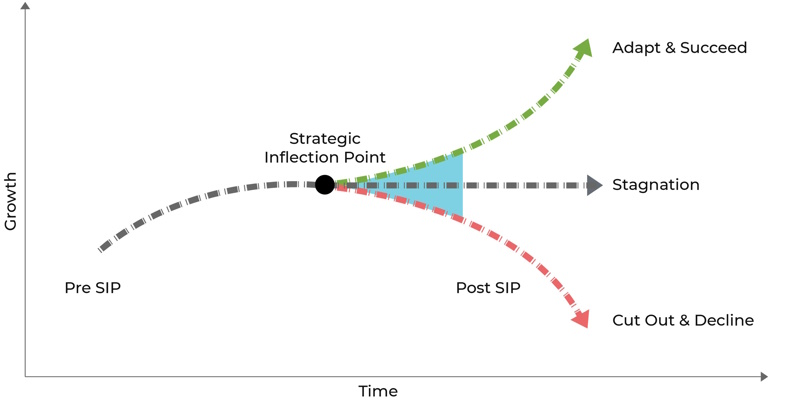In my very first blog article in December 2019, I already wrote about the strategic inflection point. Since then, I have worked with many mostly smaller to mid-sized IT companies and several of them have been exactly at this strategic inflection point. Some for the first time, some for the second or third time already. This has usually led to major transformations with drastic changes in strategy and for the organization. Maybe it is just my subjective perception, but it seems that overall the topic of transformation has never been more discussed than in the last few months.
The strategic inflection point in companies
Andy Grove, former CEO of Intel Corporation, described the strategic inflection point in detail in one of his books many years ago. Since I do not want to repeat myself here, you are welcome to read more about this in the already mentioned blog article “The Strategic Inflection Point”. For a company, a strategic inflection point almost always decides about the next wave of growth or decline. The two graphs below show the yearly revenue of two large companies that in my view are great examples for the effect of a strategic inflection point. One company (on the left) has up to now consequently used inflection points to develop new growth. The other company (on the right) has not completely disappeared from the market, but has lost a lot of its former glamour because it ignored a key strategic inflection point. Who recognizes these two companies?

These are Apple (on the left) and Nokia (on the right). But what applies to companies can equally apply to entire industries, political systems, regions, countries or even the entire world.
We are at a crucial inflection point
The transformations in the automotive industry and the energy sector, the shifts in global political power, artificial intelligence and, last but not least, the climate change are just a few examples of very big or even huge strategic inflection points that already have a much bigger impact than just deciding about the future of a single company. And some of these examples mentioned here even influence each other. Without climate change, we might not be seeing the shift in the automotive industry towards e-mobility. Climate change has certainly also already stimulated an initial rethinking in the energy sector. But the real trigger for the first steps towards a real energy transformation is Russia’s aggressive war against the Ukraine having caused rising energy prices. Everything always happens a bit faster when it affects your own wallet. When it comes to artificial intelligence, we are certainly still at the very beginning. But latest since ChatGPT this topic is simply now becoming much more tangible for most people. All of a sudden, people have an idea of how such technologies have the potential to, for example, erase entire professions and turn the job market completely upside down.
Germany’s role at this inflection point
Think about the examples above and have a look at Germany. Now you should be concerned. When it comes to e-mobility, we very likely could have been ahead of the game already many years ago. Despite all the criticism, especially of its founder, Tesla has shown how a brand new automotive company can shake up the market. And while the German automotive companies have been desperately trying to catch up now for a few years, Chinese manufacturers of electric cars are already positioning themselves. They are still not taken very seriously. But did we take Japanese cars seriously in Germany in the 1970s? We lost our leading position in solar and wind energy to China already years ago. Today, energy transformation in Germany mainly means importing liquid gas and people gluing themselves on the street instead of actively contributing to a solution. We are leaving the area of artificial intelligence entirely to others, just as we left the IT industry to Silicon Valley and Asia many years ago. For those who don’t remember, we once had innovative and globally successful IT companies, such as Nixdorf Computer AG. Unfortunately, also this company became a victim of a strategic inflection point, namely the end of the so-called vertical IT industry (hardware, operating system and application software from one source) and the triumph of the PC.
What are the chances for Germany?
Spontaneously, the answer to this question right now is “not really great,” to say it carefully. But after all, we became a leading industrial nation after the Second World War, right? The problem is simply that we missed many important developments. Again, also here a quote from Andy Grove fits perfectly: “Success breeds complacency, complacency breeds failure, only the paranoid survive”. In my view, the German automotive industry is a great example for this. Resting on the success of yesterday. And instead of working across political party lines with the industry on how to really make the energy transformation happen, the current coalition is fighting over regulating heating in private households. We have so many intelligent and capable founders with innovative ideas in Germany. But instead of really using and promoting this potential, they are already being blocked in the German bureaucratic jungle during the founding process. Here is a very recent example: a newly founded company wants to open a business account at a well-known German bank. There the founders are dispatched with the arrogant statement that “this takes at least four weeks”. In addition, they are told that all founders have to appear in person at one of the branches of the bank. At an online bank from another EU country, the whole thing then just took under four days, including transfer of the share capital and receiving the necessary statement for the entry in the commercial register – everything done online, of course.
The German startup community gives hope
What gives hope are the German startup founders. Here I explicitly do not just talk about the people in their early to mid-twenties who are generally associated with this group. There are many founders in the over-50 age group who just want to kick something off again because they firmly believe in the success of their business idea. I have met several founders between the age of 24 and 59, and although there are 35 years between them, their energy level is absolutely the same. Also, in my view, the competition between the so-called Generation Z and the so-called baby boomers that is played up in social networks by self-proclaimed influencers is completely artificial. I hate these categorizations anyway. From my experience, both generations complement each other perfectly and they can learn a lot from each other. There is so much potential that simply needs to be exploited. Above all, the government must create the right framework for this. Providing more support instead of putting even more obstacles in the way. In addition, political parties need to become more attractive again for people who really want to make a difference. So that these people become politically active in order to really change something instead of gluing themselves on the streets or pouring tomato soup on art objects. If we do not get back on track here, Germany’s curve will soon look like Nokia’s. Germany won’t disappear from the map, but it will sink into insignificance. Nobody really should want that!

